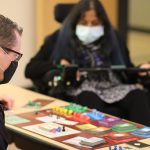After a year of careful planning, the Neag School of Education’s Two Summers Educational Technology program and the UConn School of Fine Art’s Digital Media and Design (DMD) program co-hosted the inaugural Frontiers in Playful Learning conference from June 1 – 3, 2022.
When schools were shut during COVID-19, teachers dealt with a lack of student engagement during online instruction, said Michael Young, an associate professor at the University of Connecticut’s Neag School of Education who has expertise in cognition, instruction and learning technology.
In their recently published edited volume, Exploding the Castle: Rethinking How Video Games and Game Mechanics Can Shape the Future of Education (Information Age, 2017), Neag School faculty Michael Young and Stephen Slota — both longtime video game devotees — explore the value of games, the role of games in the future of K-12 and higher education, and more. Here, Young, associate professor of cognition, instruction, and learning technology, and Slota, assistant professor-in-residence of educational technology discuss the book and share their insights on the intersection between games, technology, and learning.
There’s not much research available to prove whether or not game-based learning even works, according to a 2012 paper that University of Connecticut researchers published in the Review of Educational Research.
The tragic December deaths of 20 first-graders and six school staff members in Sandy Hook, Connecticut, along with the Boston Marathon tragedy and other recent attacks, have brought the decades-old debate over the behavioral effects of video games back onto legislative floors throughout the nation. Citing the fact that gunman Adam Lanza, 20, played violent […]


